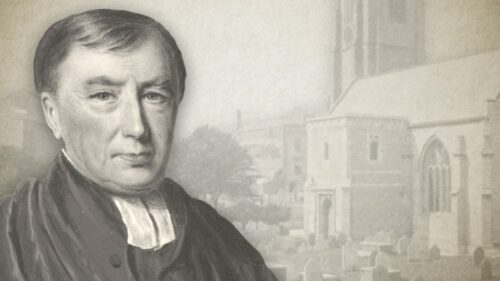
May 26—Morning Devotion
“Thou hast ascended on high, thou hast led captivity captive, thou hast received gifts for men: yea, for the rebellious also, that the Lord God might dwell among them.”—Psalm 68:18
Sweet view of a risen, ascended, and triumphant Saviour. My soul, ponder over these words, and while meditating upon them, see that thou art ascending after thy exalted head, and partaking in his glories. Jesus is he who hath indeed ascended, far above all heavens, that he might fill all things. He hath led captivity captive; and that not only in conquering all the powers of hell, but taking his people that were in captivity out of the prison-house, and causing them to partake in the felicity of his triumphs. And mark, my soul, what follows. “He hath received gifts for men;” or as the apostle to the church of Ephesus expresseth the same blessed truths, he gave gifts to men, Eph. 4:8. And sweetly Jesus hath done both; for he received that he might give. He needed not for himself, but it was all for his people. He said himself, when speaking to the Father,” that I should give eternal life to as many as thou hast given me.” And, my soul, mark another sweet expression in these words:” he hath received gifts for men:” or, as the margin of our old bibles hath it, and our old bibles are like old gold, precious things, he hath received gifts in the man; that is, in his human nature, as Mediator; to give out to his people. See, then, my soul, all thy blessings are treasured up in him, that is, in one and the same moment, thy God and thy Brother. Oh glorious thought! Oh! soul- comforting truth! Neither is this all. For this sweet scripture points out also for whom he hath received gifts. It is for men. Not for angels, but for men. Not for holy men neither, but for sinners. Not for Jews only, but for gentiles. “Yea,” saith the Holy Ghost, as if the Lord the Spirit would lay an emphasis upon it, that it might be particularly noticed,” for the rebellious also, that the Lord God might dwell among them.” Oh matchless grace! Oh world of wonders! Fallen angels passed by, and rebels of men taken into favour. Great Father of mercies, what manner of love is this, which thou hast bestowed upon our fallen nature? Oh thou risen and exalted Jesus, send down, Lord, thine ascension gifts. Nay, blessed Lord, come down thyself and dwell among us. Set up thy church in the earth, and in the hearts and souls of thy people, and reign and rule there, the Lord of life and glory.
Robert Hawker (1753-1827) was an Anglican (High-Calvinist) preacher who served as Vicar of Charles Church, Plymouth. John Hazelton wrote of him:
“The prominent features…in Robert Hawker's testimony…was the Person of Christ….Dr. Hawker delighted to speak of his Lord as "My most glorious Christ.” What anxious heart but finds at times in the perusal of the doctor's writings a measure of relief, a softening, and a mellowing? an almost imperceptible yet secret and constraining power in leading out of self and off from the misery and bondage of the flesh into a contemplation of the Person and preciousness of Christ as "the chiefest among ten thousand and the altogether lovely." Christ and Him crucified was emphatically the burden of his song and the keynote of his ministry. He preached his last sermon in Charles Church on March 18th, 1827, and on April 6th he died, after being six years curate and forty-three years vicar of the parish. On the last day of his life he repeated a part of Ephesians 1, from the 6th to the 12th verses, and as he proceeded he enlarged on the verses, but dwelt more fully on these words: "To the praise of His glory Who first trusted in Christ." He paused and asked, "Who first trusted in Christ?" And then made this answer: "It was God the Father Who first trusted in Christ."
Robert Hawker on the Biblical Covenants (Complete)
Robert Hawker's Poor Man's Morning Portions





